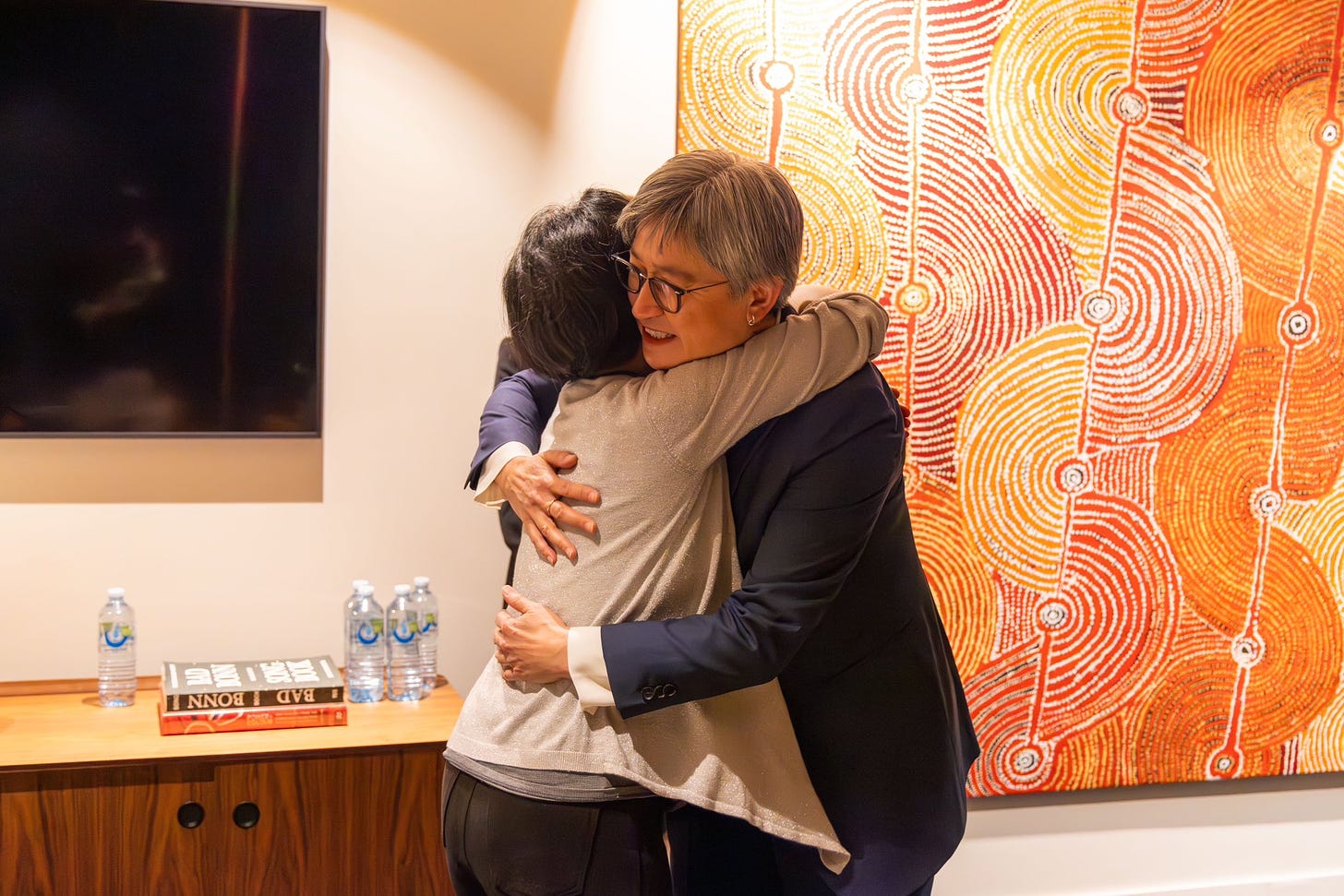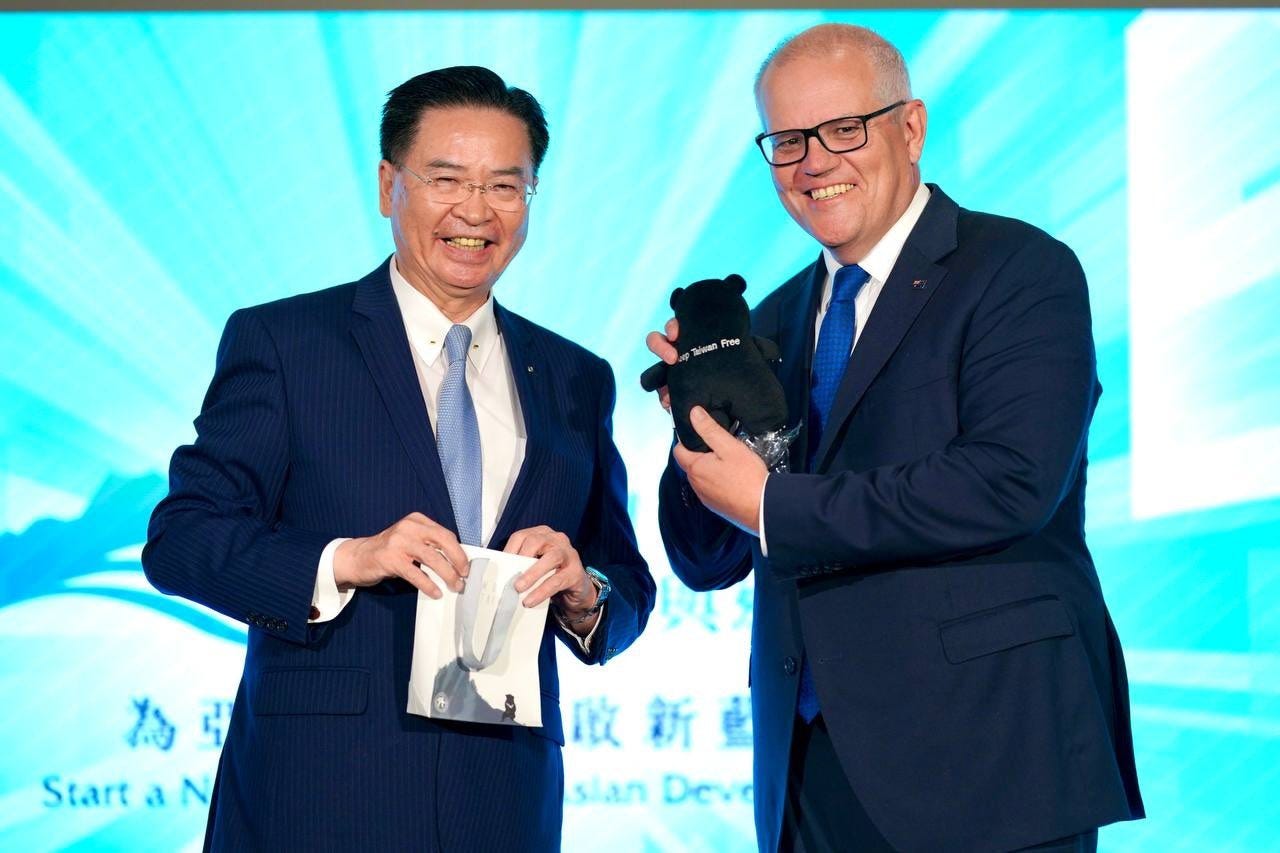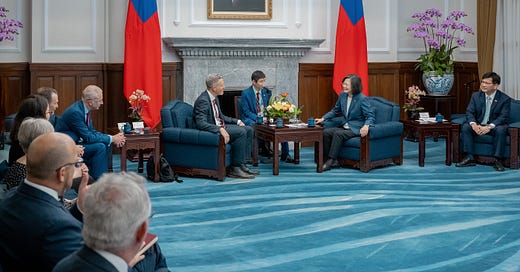China's last trade restrictions, Taiwan in the CPTPP, and a Taipei visit
Weeks of 11 September to 15 October 2023
China’s last trade restrictions
Australian Minister for Trade and Tourism Don Farrell speaking to a journalist on 13 September about his Chinese counterpart Wang Wentao:
“[H]e’s confided in me that he absolutely loves South Australian red wine.”
Quick take:
Following the late September news that visa processing for travel to Australia under the Approved Destination Status scheme had recommenced, China lifted restrictions on the import of Australian hay and chaff. Coupled with the release of long-detained Australian journalist Cheng Lei in early October, the stage looks set for both a leader-level meeting in China in the coming weeks and Beijing’s walk back of its remaining trade restrictions later this year. Of course, this doesn’t mean that complete reprieve from the trade restrictions is guaranteed. In fact, the Australian government might have even forgone a fast-tracked end to the wine duties. Australia in late September rejected a strategically questionable quid pro quo “package” deal whereby Canberra would reverse anti-dumping measures on select Chinese manufactured products in exchange for the removal of Beijing’s wine duties. In the wake of this rejection the (non-authoritative) Global Times quoted an unnamed “insider” suggesting that the removal of wine duties might be delayed: “unlike barley, wine is not a necessity and not irreplaceable. In terms of cost-effectiveness, Australian red wine lacks advantages. The urgency to remove tariffs is not high.”
Despite this downcast message from a nationalist segment of the Chinese tabloid press, a pathway for the removal of the trade restrictions against wine, lobster, and beef looks likely this year. Regarding China’s remaining trade restrictions, Minister Farrell said in September: “I would be very confident, particularly in the lead‑up to further meetings, that both myself and the Prime Minister will be involved in, in China later this year, that we can resolve all of those outstanding issues.” To be sure, Minister Farrell’s confidence doesn’t alone mean that the remaining trade restrictions will tumble. Moreover, rather than making a firm prediction, Minister Farrell’s real intent might have been to signal Australia’s expectations for forthcoming meetings. And regardless of Canberra’s goals, it might equally make sense for Beijing to not unwind all the remaining restrictions to retain some leverage over the Australian government.
Though it’s certainly possible that the year will end without any firm signs that the remaining trade restrictions will go, a range of factors indicate China’s likely willingness to remove these blockages. On top of China’s track record of progressively unwinding trade restrictions over the course of 2023, the increasingly optimistic messaging about bilateral ties from the Chinese government and the prioritisation of the forthcoming Australian prime ministerial visit suggest that Beijing is in the mood to further repair the economic relationship. At the same time, China’s goal of getting Australia on board with its bid for membership of the Comprehensive and Progressive Agreement for Trans-Pacific Partnership (CPTPP) provides a strong impetus to remove the remaining trade barriers. These and other considerations point to a pathway for an end to the last few trade restrictions. This assessment is admittedly far from definitive. But if I was taking a punt, I’d bet on Minister Farrell’s confidence being prescient.

Backing Taipei’s trade block bid
Australian Shadow Minister for Foreign Affairs Simon Birmingham speaking to a journalist on 27 September about Taiwan’s bid to join the CPTPP:
“[I]f they can meet the high standards of trade liberalisation and accountability that apply under the CPTPP … they should be welcomed as a member.”
Quick take:
Caveated as it might have been, this political support for Taiwan’s CPTPP aspirations is noteworthy. To be sure, backing Taipei’s CPTPP bid isn’t entirely new in Canberra. A 2022 report from the Joint Standing Committee on Foreign Affairs, Defence and Trade recommended that Australia support Taiwan’s CPTPP accession, while press reporting in 2021 suggested that private discussions were taking place in Canberra and Tokyo about a possible path for Taipei to join. Still, Senator Birmingham’s senior shadow ministry position adds extra political weight to this support, albeit from the opposition benches. This qualified backing of Taipei’s CPTPP bid was followed by a speech in Taiwan in which former prime minister and now opposition backbencher Scott Morrison made the same call. Coupled with Taipei’s vocal case for membership, the Albanese government now faces a push from both the Taiwanese government and the opposition to support Taiwan’s entry into the CPTPP.
Notwithstanding the above, it’s unlikely that the opposition Coalition will push the government especially hard on this front given their own patchy record on trade deals with Taiwan. It was under the Coalition Turnbull government that Canberra backed away from a mooted bilateral free trade agreement with Taipei, apparently at the behest of Chinese Minister for Foreign Affairs Wang Yi. Meanwhile, the Coalition Morrison government was publicly noncommittal on whether it would support Taiwan’s effort to join the CPTPP. Given that highlighting the Albanese government’s caution on trade deal making with Taiwan will also draw attention to the Coalition’s timidity, it’s probable that prodding from the opposition on Taipei’s CPTPP entry will remain politically gentle.
Still, the urgency of Taiwan’s call for Australian support is likely to grow. Taipei seems to fear precisely the same thing that gives Beijing hope. With China’s trade restrictions being progressively dismantled, the most potent reason for keeping Beijing out of the CPTPP is likely to become incrementally less persuasive in Australia. To be clear, Beijing’s CPTPP bid is still a non-starter while the last few trade restrictions are in place, as Australian ministerial statements make plain. And even if China’s remaining trade restrictions are removed, there’ll still be, as I’ve floated previously, reasons for Australia to view China’s CPTPP bid with scepticism. Among other considerations, the experience of Beijing’s economic coercion over the last few years will prompt many in Australia to doubt the wisdom of fostering even deeper trade interdependence with China, while also causing them to question the value of any new trade commitments that Beijing might make. Still, Beijing probably hopes, and Taipei likely fears, that China’s prospects of swinging Australia behind its CPTPP bid will grow as the Chinese government does away with the last trade restrictions and turns up its efforts to woo Canberra.
Regardless of whether the normalisation of Australia-China trade ties actually prompts Canberra to drop its objections to Beijing’s CPTPP entry, I’d expect Taipei to pursue its advocacy with added urgency. Taipei surely knows that while its CPTPP ambitions are already a long shot, they’ll be dead in the water if Australia and other members admit China and thereby hand it veto power in the CPTPP’s consensus-based decision-making. As Taiwan’s recently appointed representative in Sydney, David Cheng-Wei Wu, put it earlier this month: “If one day China becomes a member of CPTPP, because they take the consensus model [of admitting new members], I believe the Chinese government will block our application.” So, more urgent CPTPP agitation from Taipei is (understandably) likely. Not only is Taiwan gunning for Australian support, but Taipei knows that its path into the CPTPP will be definitively blocked if Canberra and other member capitals decide to back Beijing’s bid.

A Taiwan trip
Taiwanese President Tsai Ing-wen addressing visiting Australian parliamentarians on 26 September:
“Your visit demonstrates Australia’s cross-party support for Taiwan and will further deepen the relationship between our countries.”
Quick take:
In recent weeks, senior Chinese leaders, the Ministry of Foreign Affairs, and China’s Ambassador Xiao Qian have all emphasised the prospects for improved bilateral relations. But even when upbeat sentiments fill the air, frustrations are never far away. And a bipartisan and widely publicised Australian parliamentary visit to Taipei unsurprisingly displeased Beijing despite the generally positive bilateral atmospherics. The parliamentary visit included a meeting with President Tsai, a dinner hosted by Foreign Minister Joseph Wu, and positive messages about shared Australian and Taiwanese interests and values. On top of the high-level access and warm rhetoric, this visit was notable for being foreshadowed in advance and broadly advertised. Not only were photos and a readout of the meeting with President Tsai posted on her office’s website and X, but the visit was publicly discussed by a member of the delegation weeks before it took place.
Australian parliamentary visits to Taiwan are, of course, nothing new (e.g., here, here, here, here, here, and here). Still, it is noteworthy that details were released and advertised in the lead up to and during the visit. This is especially conspicuous considering that other visits to Taiwan by Australian parliamentarians in recent years have been comparatively discreet (see here for examples of recent visits that were largely kept under wraps). Indeed, this latest visit even contrasts with last year’s, which (unless I’ve missed something) had a much smaller social media footprint and was only publicly discussed by a participant once they were in Taiwan. (Though the visit was admittedly mentioned briefly by Prime Minister Anthony Albanese in advance in response to a question from a journalist.)
It’s probably too soon to conclude from this latest delegation that future Australian parliamentary visits to Taiwan are also more likely to be loud and proud. At the very least though, it seems that the Chinese government’s attempts to dissuade Australian parliamentarians from visiting Taiwan aren’t working. Not only are Australian politicians still heading to Taipei, but they appear to be doing so with more fanfare. In Australia and a wide range of other democracies, China’s efforts to isolate Taiwan politically appear to be having the opposite effect: prompting yet more publicised parliamentary visits.

As always, thank you for reading, and please excuse any errors (typographical or otherwise). Any and all objections, criticisms, and corrections are very much appreciated.




Global Times is the nationalist segment of the Chinese tabloid press?
'Nationalist' compared to what similar Western medium?
Or are you confusing 'nationalism' with being frank?
If Canberra thinks it can continue meddling with Chinese internal affairs in Taiwan, it will be a cold day in Hell before Penfolds returns to the shelves there.
Australia's long standing policy of bare-faced, back-stabbing, duplicitous lying to and about China will bear bitter fruit before next year's end.